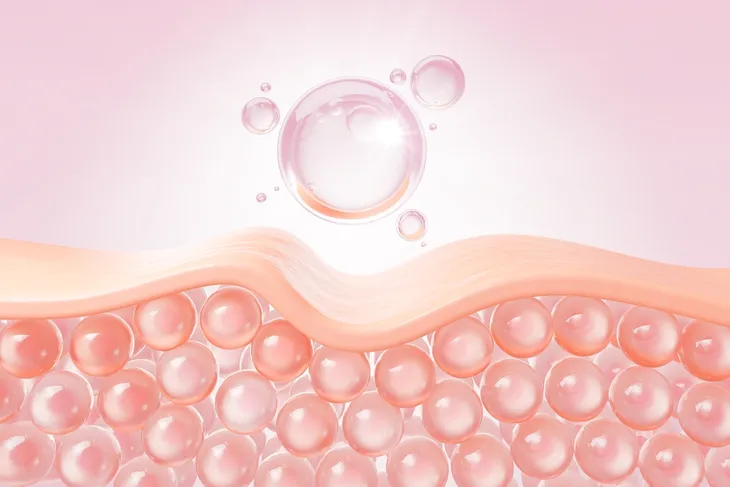- Our body naturally starts producing less collagen as we age. This can lead to signs of aging like wrinkles, achy joints, and muscle loss.
- Many people are turning to collagen supplements to counteract these effects.
- Not all supplements are created equal. Here’s a look at what liquid collagen is, how it compares to the powdered form, and what health benefits it has to offer.
Have you noticed a sudden influx in trendy collagen supplements? You’re not alone. Liquid collagen has made a huge impact in the health food industry with promises of better skin, hair, and joints.
But what is liquid collagen exactly? How does it compare to the powdered form and does it actually offer health benefits? We’ll answer that and more in this article.
What Is Collagen?
Your body naturally makes collagen, which Medical News Today explains is an essential protein that provides structure to tissues, such as the skin, bones, ligaments, tendons, muscles, organs, teeth, and blood vessels. The source says collagen accounts for 33-percent of the body’s total protein mass.
Healthline also points out that there are 28 types of collagen but the following four are the most common:
- Type I is the most common type and is found in all connective tissue.
- Type II is found in the joints and intervertebral discs.
- Type III is the main part of reticular fibers that are found in the skin and blood vessels.
- Type IV is the component of your kidneys, inner ear, and eye lens.
Why Is Collagen Supplementation Popular?
Unfortunately, as you age, Healthline says your body starts producing less collagen. Over time, this can lead to signs of aging like sagging skin, wrinkles, and even a reduction in bone strength. This is why many people are turning to collagen supplementation.
Collagen supplements have become very popular in recent years and the source says most types are hydrolyzed. Meaning, the large proteins in the supplement are already broken down. This saves your body an extra step and may make it easier to absorb. Collagen supplements are also available in different forms. Powdered collagen may be the most popular but it’s also available in capsules, and liquid collagen is becoming increasingly popular.
Types of Liquid Collagen
The source of collagen found in liquid collagen products can vary, so it’s helpful to know the differences before buying a supplement. According to Medical News Today, beef tissues are the most common source of collagen in supplements. This is typical because the body can absorb bovine collagen really well.
Some supplements also use collagen from pigs, which is also easy to absorb. You may also find collagen from sheep, chicken, duck, or rabbit skin in other products. Pescatarian-friendly collagen products typically use marine collagen from fish or marine invertebrates (such as jellyfish or sponges). The source also notes that marine collagen is one of the most popular types in the cosmetic industry. Marine collagen also causes “less inflammation than animal sources and is less likely to contain contaminants.”
Popular Liquid Collagen Products
To make collagen supplements, Verywell Health says collagen is extracted from its animal source and made into supplements. While you can buy liquid collagen (which can be mixed into drinks like smoothies), premade collagen drinks exist too. These may be a more attractive option as they’re premixed, ready to drink, and available in a variety of tasty flavors.
Popular brands like Flow and Vital Proteins offer collagen water in flavors like watermelon, strawberry lemon, and blackberry hibiscus. Gldn Hour is another trendy collagen beverage that’s made of marine collagen and sparkling water. They also offer an array of delicious flavors like peach ginger, strawberry mint, and watermelon lime.
Collagen Powders
It’s also worth noting that collagen supplements are available in powder form. Powdered collagen is available in a variety of flavors and can be mixed into food and beverages. If you’d rather not taste your supplement, opt for an unflavored powder and blend it into a smoothie or soup.
Verywell Health says the powder tends to dissolve in warm liquids best but you can still drink it in a cold beverage. The source suggests dissolving the powder in a small amount of warm water and then adding it to your smoothie or cold drink.
Liquid Collagen Vs. Powder Collagen: Which Is Better?
We already know that collagen is available in powder and liquid forms but you might be wondering if one supplement is better than the other. Since most types are hydrolyzed, one form isn’t usually better than the other.
Hydrolyzed collagen is not only easier for the body to absorb but it also helps the powder and liquid form dissolve better into liquids. So, whether you choose powdered or liquid collagen will be a personal choice. If you prefer to customize your beverages, you may want to opt for powdered collagen but if you prefer convenience, liquid collagen may be the better option for you.
Liquid Collagen May Benefit Your Skin
Collagen plays an integral role in strengthening your skin. Healthline says it also plays a role in your skin’s elasticity and hydration. But as you age, your body produces less collagen, which can lead to fine lines, wrinkles, and dryer skin. By supplementing liquid collagen, you may help slow the aging of your skin.
The source said one study observed a group of women and found that taking 3- to 10-grams of collagen daily led to improvements in skin hydration and elasticity. While more research is needed, there are anecdotal claims that suggest collagen supplements may also help prevent acne and other skin conditions.
 Shutterstock/JLco Julia Amaral
Shutterstock/JLco Julia AmaralLiquid Collagen May Benefit Your Joints and Bones
Collagen also plays a role in keeping the cartilage in your joints healthy. Since collagen production decreases as you age, Healthline says your risk of degenerative joint disorders (such as osteoarthritis) increases. Some research suggests that taking collagen supplements can help improve symptoms of osteoarthritis as well as reduce overall joint pain.
Additionally, liquid collagen may also benefit your bones. The source explains that bones are mostly made of collagen, which means as we age, bone mass begins to deteriorate too. This can increase your risk of osteoporosis. Research suggests that collagen supplements can help prevent bone breakdown, which in turn, may help prevent osteoporosis.
Liquid Collagen May Benefit Your Muscles
Unfortunately, as we age, we also start to lose muscle. Age-related muscle loss is known as sarcopenia and Harvard Health says you start to lose as much as 3- to 5-percent per decade after age 30. The source also notes that most men lose about 30-percent of their muscle mass during their lifetimes. Luckily, collagen may be able to help.
Verywell Health said one study found that a combination of strength training and daily collagen supplement helped build and keep muscle mass over time. Harvard Health also notes that increasing your protein intake may also help preserve muscle mass.
Liquid Collagen May Benefit Heart Health
Some research also suggests collagen supplementation may benefit heart health. One 6-month study examined 31 healthy adults who took 16-grams of collagen a day. According to Healthline, the study found that the individuals “experienced a significant reduction in measures of artery stiffness.” Their HDL (good) cholesterol levels also rose by roughly 6-percent.
While more research is needed, the preliminary research suggests promising results. The Mayo Clinic says other ways you can keep your heart healthy include maintaining a healthy weight, exercising regularly, eating a healthy diet, managing stress, quitting smoking, drinking alcohol in moderation, and getting regular health screenings.
Other Health Benefits of Liquid Collagen
The potential benefits of liquid collagen don’t end there. While more human research is needed to support these claims, anecdotal evidence suggests the following are additional benefits of collagen supplementation:
- Collagen may improve nail strength and it may help your hair and nails grow longer.
- Some believe collagen supplements can help improve gut health, particularly leaky gut syndrome.
- Some people believe collagen may support brain health, particularly in improving mood.
- Some believe collagen may promote weight loss.
Does Liquid Collagen Produce Side Effects?
According to Medical News Today, most people can tolerate collagen supplements. That said, it’s always important to consult your doctor before taking a new supplement. Your doctor can help you weigh the risks and benefits based on your health history.
Liquid collagen doesn’t typically produce side effects, however, some people may experience an allergic reaction. For example, someone with a shellfish allergy may develop an allergic reaction to marine collagen. Always read the ingredients and take extra precautions. If you develop any other new symptoms after taking a collagen supplement, you should stop taking it immediately and consult your doctor.
Are There Any Risks?
Medical News Today points out that collagen supplements are regulated by the U.S. Food and Drug Administration (FDA), which means it’s regulated as a food product, not a medicine. This means supplement companies are not required to prove the effectiveness or safety of the product. As a result, this might mean the product doesn’t work. However, the source warns there are some other risks to be aware of.
For starters, some supplements may inaccurately list their ingredients which may be a problem for people who avoid certain animal products for dietary, ethical, or religious reasons. Additionally, the source says some liquid collagen supplements contain additional vitamins, minerals, or herbs, which may interact with some medications. Luckily, the source says you can avoid these risks by only buying collagen supplements that have undergone third-party testing to ensure they’re pure and come from safe sources.















